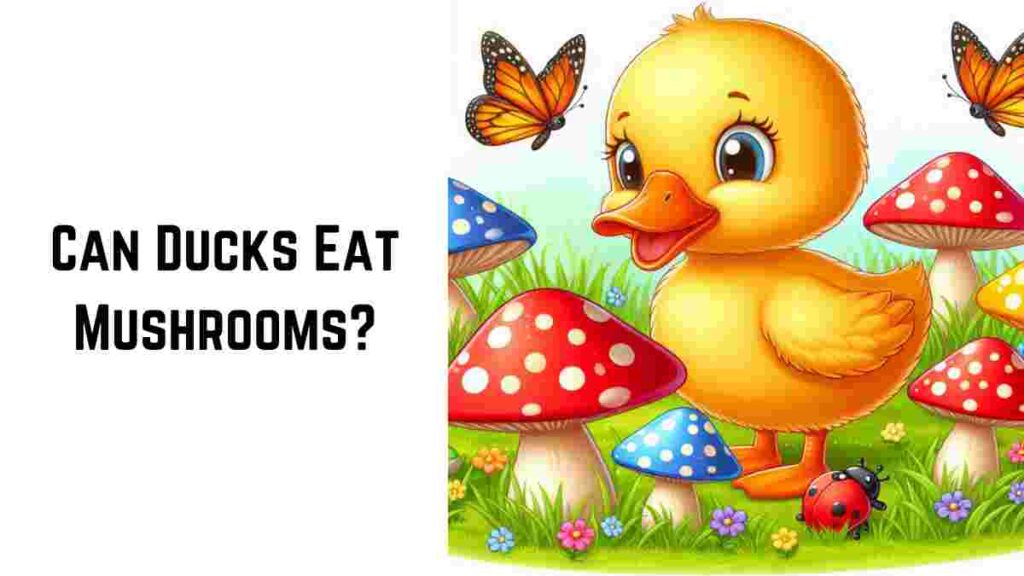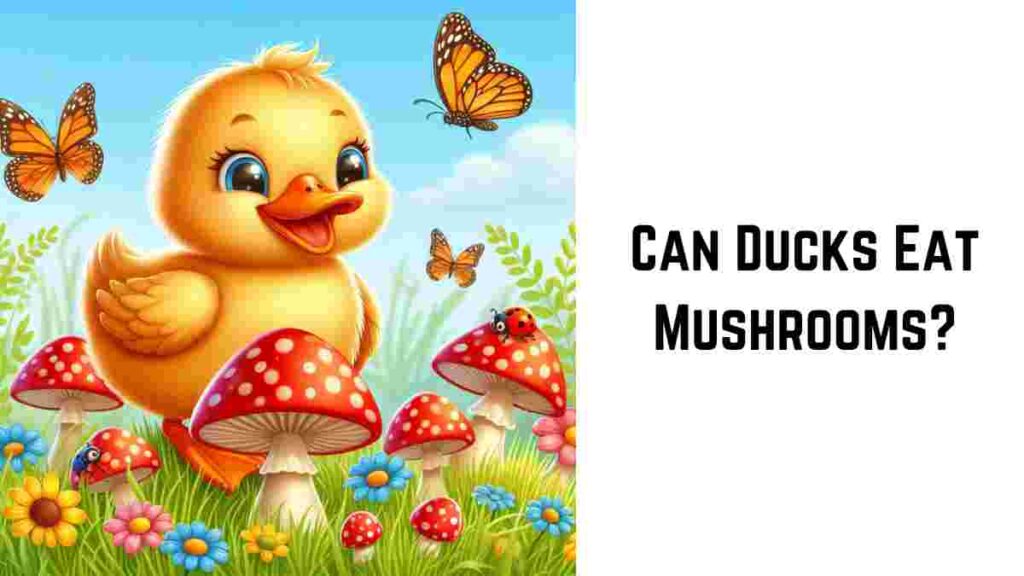Can Ducks Eat Mushrooms: Ducks are versatile omnivores with a diet that includes a variety of foods ranging from grains and vegetables to small aquatic creatures. One question that often arises among duck enthusiasts and poultry farmers is whether ducks can safely consume mushrooms.
This topic is of particular interest due to the diverse nature of mushrooms, which can range from highly nutritious to deadly toxic. In this comprehensive article, we will explore the relationship between ducks and mushrooms, examining the nutritional benefits, potential risks, and best practices for incorporating mushrooms into a duck’s diet.
Amazing Wooden Duck Houses At Reasonable Cost

Table of Contents
Understanding a Duck’s Diet – Can Ducks Eat Mushrooms?
Ducks, whether wild or domesticated, have a varied diet that typically includes:
- Grains and seeds: Wheat, corn, barley, oats, and various seeds.
- Vegetables: Leafy greens, peas, and root vegetables.
- Fruits: Apples, berries, and grapes.
- Protein sources: Insects, small fish, and snails.
The dietary needs of ducks are diverse, and their ability to forage allows them to consume a wide range of natural food sources. This foraging behavior makes the consideration of mushrooms in their diet a relevant topic.
Nutritional Profile of Mushrooms
Mushrooms are valued for their nutritional content, which includes a variety of vitamins, minerals, and bioactive compounds. Below is a table that highlights the nutritional composition of common edible mushrooms (per 100 grams):
| Nutrient | White Button Mushroom | Shiitake Mushroom | Portobello Mushroom |
|---|---|---|---|
| Calories | 22 | 34 | 22 |
| Protein (g) | 3.1 | 2.2 | 2.1 |
| Carbohydrates (g) | 3.3 | 6.8 | 3.9 |
| Dietary Fiber (g) | 1.0 | 2.5 | 1.0 |
| Fat (g) | 0.3 | 0.5 | 0.3 |
| Vitamin D (IU) | 7 | 18 | 0 |
| Vitamin B2 (mg) | 0.4 | 0.5 | 0.5 |
| Niacin (mg) | 3.6 | 3.9 | 4.5 |
| Potassium (mg) | 318 | 304 | 364 |
| Phosphorus (mg) | 86 | 112 | 108 |
| Selenium (µg) | 9.3 | 2.0 | 26.0 |
| Copper (mg) | 0.3 | 0.9 | 0.3 |
These values illustrate that mushrooms can provide a range of nutrients beneficial to ducks, including proteins, vitamins, and minerals. However, not all mushrooms are created equal, and their safety and edibility must be carefully considered.

Edible vs. Toxic Mushrooms – Can Ducks Eat Mushrooms?
The primary concern when it comes to feeding ducks mushrooms is the distinction between edible and toxic varieties. Edible mushrooms, like those listed in the table, can offer health benefits. However, many wild mushrooms are highly toxic and can be fatal if ingested.
Common Edible Mushrooms:
- White Button Mushrooms (Agaricus bisporus): Mild flavor, widely cultivated, rich in B vitamins.
- Shiitake Mushrooms (Lentinula edodes): Earthy flavor, known for immune-boosting properties.
- Portobello Mushrooms (Agaricus bisporus): Mature form of the button mushroom, meaty texture.
Common Toxic Mushrooms:
- Amanita phalloides (Death Cap): Highly toxic, can cause liver and kidney failure.
- Amanita muscaria (Fly Agaric): Contains psychoactive compounds, can cause severe neurological effects.
- Galerina marginata (Deadly Galerina): Contains amatoxins, highly toxic.
It is crucial to ensure that any mushrooms fed to ducks are safe, non-toxic varieties. Given the difficulty in identifying mushrooms, particularly wild ones, it is generally safer to rely on store-bought, edible mushrooms if one chooses to include them in a duck’s diet.
Potential Benefits of Feeding Ducks Mushrooms
If safe, edible mushrooms are chosen, they can provide several nutritional benefits to ducks:
- Protein Source: Mushrooms contain protein, which is essential for the growth and maintenance of feathers, muscles, and overall health.
- Vitamins and Minerals: Mushrooms are rich in vitamins such as B vitamins and minerals like selenium and potassium, which are crucial for metabolic processes and immune function.
- Dietary Fiber: Fiber aids in digestion and can help maintain a healthy gut in ducks.
Risks of Feeding Ducks Mushrooms
Despite the nutritional benefits, there are significant risks associated with feeding mushrooms to ducks:
- Toxicity: The most pressing risk is accidental ingestion of toxic mushrooms, which can lead to severe poisoning or death.
- Digestive Issues: Some ducks may have difficulty digesting certain types of mushrooms, leading to gastrointestinal distress.
- Allergic Reactions: Although rare, some ducks may be allergic to certain fungi, which could cause adverse reactions.
Best Practices for Feeding Ducks Mushrooms
To safely incorporate mushrooms into a duck’s diet, the following best practices should be observed:
- Identify Safe Varieties: Only feed ducks mushrooms that are known to be safe and edible. Avoid wild mushrooms unless their safety is certain.
- Moderation: Introduce mushrooms gradually and in small quantities to observe any adverse reactions.
- Preparation: Cook mushrooms to aid digestion and reduce any potential anti-nutritional factors. Raw mushrooms are harder to digest and may contain compounds that are less beneficial.
Observing Duck Behavior and Health
When introducing any new food to a duck’s diet, it is crucial to monitor their behavior and health. Signs of mushroom toxicity or dietary distress include:
- Lethargy
- Diarrhea
- Vomiting
- Loss of appetite
- Neurological symptoms (e.g., staggering, seizures)
If any of these symptoms occur after feeding mushrooms, it is important to seek veterinary assistance immediately.

Conclusion – Can Ducks Eat Mushrooms?
The question of whether ducks can eat mushrooms is complex and requires careful consideration of both the nutritional benefits and potential risks. While edible mushrooms can provide valuable nutrients, the dangers posed by toxic varieties make it essential to approach this dietary choice with caution. By following best practices and remaining vigilant about the types of mushrooms offered, ducks can safely enjoy the occasional mushroom as part of a balanced diet. Always prioritize the health and safety of your ducks by ensuring any new food is thoroughly researched and introduced responsibly.
Frequently Asked Questions (FAQ) – Can Ducks Eat Mushrooms?
Can ducks eat all types of mushrooms?
No, ducks should not eat all types of mushrooms. While some mushrooms are safe and nutritious, many others are toxic and can be fatal if consumed. It’s essential to only feed ducks mushrooms that are known to be safe and edible, such as those commonly found in grocery stores (e.g., white button, shiitake, portobello).
How can I tell if a mushroom is safe for my ducks to eat?
Identifying safe mushrooms can be challenging, especially in the wild. It is safest to feed ducks commercially available edible mushrooms. Avoid feeding wild mushrooms unless you are an expert in mycology and can confidently identify non-toxic species.
What are the nutritional benefits of feeding ducks mushrooms?
Mushrooms can provide several nutritional benefits, including:
Protein: Essential for growth and feather maintenance.
Vitamins: Rich in B vitamins, which are important for metabolism.
Minerals: Contain potassium, phosphorus, and selenium, supporting various bodily functions.
Dietary Fiber: Aids digestion and maintains gut health.
What are the risks of feeding ducks mushrooms?
The primary risks include:
Toxicity: Ingesting toxic mushrooms can cause severe poisoning or death.
Digestive Issues: Some ducks may have trouble digesting mushrooms, leading to gastrointestinal distress.
Allergic Reactions: Although rare, some ducks may be allergic to certain fungi, causing adverse reactions.
How should mushrooms be prepared before feeding them to ducks?
It is best to cook mushrooms before feeding them to ducks. Cooking helps break down tough fibers and reduces potential anti-nutritional factors, making them easier to digest. Raw mushrooms can be harder for ducks to digest and may contain compounds that are less beneficial.
How much mushroom can I feed my ducks?
Introduce mushrooms gradually and in small quantities. Monitor your ducks for any adverse reactions. Mushrooms should be a minor part of their diet, complementing their primary food sources like grains, vegetables, and protein sources.
What signs should I look for to determine if my duck is having a negative reaction to mushrooms?
Signs of a negative reaction include:
Lethargy: Unusual tiredness or lack of energy.
Diarrhea: Loose or watery stools.
Vomiting: Regurgitating food.
Loss of Appetite: Refusal to eat.
Neurological Symptoms: Staggering, seizures, or other unusual behavior.
If you notice any of these symptoms, seek veterinary assistance immediately.
Are there any specific types of mushrooms that are particularly dangerous for ducks?
Yes, several types of mushrooms are highly toxic and should be strictly avoided. Some of the most dangerous include:
Amanita phalloides (Death Cap)
Amanita muscaria (Fly Agaric)
Galerina marginata (Deadly Galerina)
These mushrooms contain potent toxins that can cause severe poisoning or death.
Can baby ducks eat mushrooms?
It is generally advisable to avoid feeding baby ducks mushrooms. Their digestive systems are more sensitive, and introducing mushrooms can pose unnecessary risks. Stick to a diet specifically formulated for ducklings, which includes the necessary nutrients for their growth and development.
Can ducks forage for mushrooms in the wild safely?
Foraging for mushrooms in the wild is risky for ducks due to the high potential for encountering toxic species. It is safer to provide ducks with a controlled diet that includes known, safe foods. If you allow ducks to forage, ensure they are in areas where toxic mushrooms are not present.
What should I do if I suspect my duck has eaten a toxic mushroom?
If you suspect your duck has eaten a toxic mushroom, seek veterinary assistance immediately. Early intervention is crucial in cases of mushroom poisoning. Provide the vet with as much information as possible, including the type of mushroom (if known) and the symptoms your duck is experiencing.
By following these guidelines and being vigilant about the types of mushrooms offered, you can safely include mushrooms in your ducks’ diet, ensuring they benefit from the nutritional advantages without the risks.
